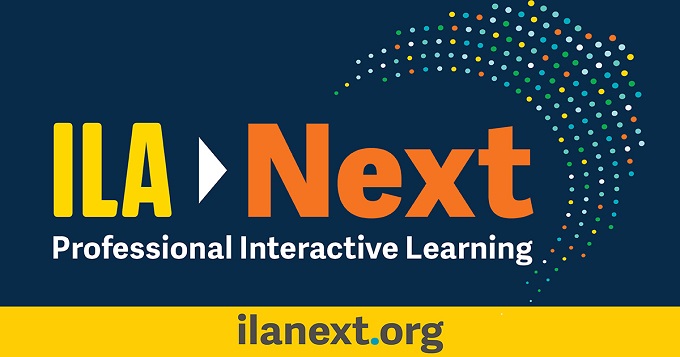 Tomorrow marks the start of the second week of ILA Next, the International Literacy Association’s new, monthlong professional learning event. Three of the four Main Stage Sessions scheduled for October 10, 9:00 a.m.–10:30 a.m. ET, speak directly to the impact of the global COVID-19 pandemic has had on education, including effective, evidence-based instructional strategies for virtual and hybrid learning and why we should leverage the disruption to reimagine the schooling system overall.
Tomorrow marks the start of the second week of ILA Next, the International Literacy Association’s new, monthlong professional learning event. Three of the four Main Stage Sessions scheduled for October 10, 9:00 a.m.–10:30 a.m. ET, speak directly to the impact of the global COVID-19 pandemic has had on education, including effective, evidence-based instructional strategies for virtual and hybrid learning and why we should leverage the disruption to reimagine the schooling system overall.
COVID wove a common thread through Week 1’s Main Stage keynotes, sessions, and workshops as well—everything from the practical implications of young learners wearing masks (“How do I support children in helping them figure out what facial expressions and feels are like when half of our face or most of our face is covered?” mused Kass Minor, in a Learning Lab she copresented with partner Cornelius Minor) to the long-term significance of the increased screen time that comes with distance and hybrid learning models.
“How can we as educators move forward in a productive way to reframe our own stance toward the use of digital devices?” asked Troy Hicks, in his Secondary Pathway Workshop, citing the need for educators to work toward what he calls “digital diligence.” Teaching students to be intentional in their use of technology and alert to “how knowledge gets made” is crucial, he says,
Here are some additional themes that emerged throughout the week.
Poetry is a powerful means of expression…
Anthony John Wiles, Jr., the 2020 National Student Poet for the Northeast region, read from his award-winning “American Dreaming,” in which he envisions a land where “the color of my skin would not jeopardize my right to breathe.” Later, Jasmyn Wright, a classroom teacher and founder of the Push Through Organization, debuted her “two-minute philosophy of education” in spoken word form:
You’re can’ts will become I cans
‘I am not’ transforms to ‘I ams’ and
<
‘I am not good enough’ replaced with
I was birthed with a purpose and
my purpose has a purpose so
Imma push through
…as well a valuable instructional tool.
In the Primary Pathway Workshop, Tim Rasinski talked about how poems and songs make ideal decodable texts, demonstrating how their rhymes can be used to teach word families, fluency, and even writing. Over in the Middle Pathway Workshop. Kylene Beers and Bob Probst led participants through a writing prompt modeled after the poem “Where I’m From” by George Ella Lyons, after which Beers reminded participants that writing is more than a way to show what we’ve learned: “Sometimes, like in the midst of a worldwide pandemic, we should probably use writing as a way through what we’re feeling.”
Speaking of feelings…
Debra Crouch, whose special presentation with Brian Cambourne closed out Saturday’s Main Stage Session, teared up as she shared Maya Angelou’s famous quote, “People will forget what you said, people will forget what you did, but people will never forget how you made them feel.”
“More than anything, today, especially now, children need us to take these wise and kind words to heart,” Crouch said, “so that we are providing the kind of environment kids need to be able to be who they are.”
Wright noted the “human-to-human connection” between educators and students. “We have to be able to take academics and infuse it here,” she said, pressing her fist to her heart. “We’re literally responsible for the future.”
We need to reframe our thinking…about a lot of things.
Hicks cited the media narrative around the use (often characterized as overuse) of screen time, which he says invokes fear-based responses instead of inviting deeper conversation around the tools students are using and the ways in which they’re using them.
Intermediate Pathway Workshop leader Molly Ness, for example, shared a strategy for fluency instruction that called for students to use iPads to record and reflect on their own oral reading, while in his Learning Lab, Ernest Morrell offered ways to engage students by critically analyzing and even creating their own video games.
Kass Minor raised questions about school-mandated homework (“What does it mean to do homework when home is school?”) and standardized tests.
“Aside from agility, stamina, and resource acquisition, what valuable information are we assessing?” she demanded, advocating instead for “kid-watching,” which she believes is “one of the strongest forms of assessment.”
Several presenters took aim at deficit language and mindsets. Morrell, for instance, challenged the notion of cultural responsiveness as a negative topic. He sees it as an empowering one, pointing to opportunities for inclusiveness and dialogue in literacy instruction, adding, “I think of engagement and joy as the real outcomes.”
On a similar note, Cornelius Minor guided his Learning Lab participants to push back on the idea that kids are somehow falling behind as a result of remote, hybrid, or socially distanced learning.
Instead, he said, “I want to frame this as a conversation about the new literate opportunities that we can seize as a result of being forced into this new paradigm shift.”
Expect to hear more of Minor’s thoughts on the COVID paradigm shift in his Main Stage Session this Saturday.
All registrants have on-demand access to over 36 hours of recorded sessions, workshops, discussion groups, and more through January 31, 2021. Registration is just $99 for ILA members. Learn more and register at ilanext.org.
Lara Deloza is the Director of Communications at the International Literacy Association.